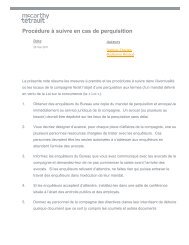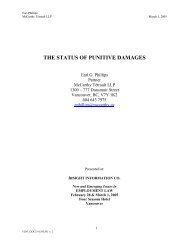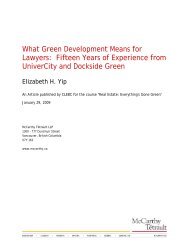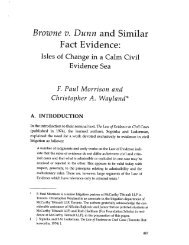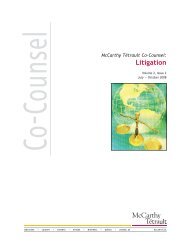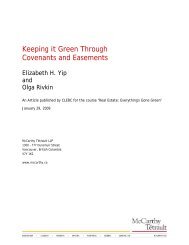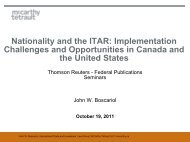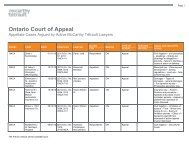The Doctrine of Public Policy in Canadian Contract Law
The Doctrine of Public Policy in Canadian Contract Law
The Doctrine of Public Policy in Canadian Contract Law
Create successful ePaper yourself
Turn your PDF publications into a flip-book with our unique Google optimized e-Paper software.
<strong>The</strong> <strong>Doctr<strong>in</strong>e</strong> <strong>of</strong> <strong>Public</strong> <strong>Policy</strong> <strong>in</strong> <strong>Canadian</strong> <strong>Contract</strong> <strong>Law</strong> 1 33<br />
judicial notice <strong>of</strong> chang<strong>in</strong>g social circumstances.14 In view <strong>of</strong> the ability to take<br />
judicial notice <strong>of</strong> "legislative" and "social" facts (i.e., facts which do not concern<br />
the immediate parties),'75 the traditional evidentiary difficulties <strong>in</strong>volved <strong>in</strong><br />
identify<strong>in</strong>g the content <strong>of</strong> a given head <strong>of</strong> public policy may now be dim<strong>in</strong>ish<strong>in</strong>g<br />
.176<br />
<strong>The</strong> rule that evidence is not admissible to show whether a specific<br />
contract is <strong>in</strong> violation <strong>of</strong> public policy would also appear to be <strong>in</strong> decl<strong>in</strong>e.<br />
Indeed, the Newfoundland Court <strong>of</strong> Appeal recently admitted extr<strong>in</strong>sic evidence<br />
to determ<strong>in</strong>e whether a seem<strong>in</strong>gly <strong>in</strong>nocuous contractual provision was ta<strong>in</strong>ted<br />
by a purpose which would render its enforcement contrary to public policy. 177<br />
In addition, the question <strong>of</strong> whether a given contract is contrary to the doctr<strong>in</strong>e<br />
may be partly resolved through reliance on <strong>in</strong>terpretive presumptions. Although<br />
the courts will not generally <strong>in</strong>terpret a contract <strong>in</strong> order to further the goals <strong>of</strong><br />
the public policy doctr<strong>in</strong>e,'78 there exists a pr<strong>in</strong>ciple that "F<strong>in</strong> constru<strong>in</strong>g a<br />
contract, parties are taken to have <strong>in</strong>tended to produce results that are legal,<br />
rather than illegal and the construction yield<strong>in</strong>g the lawful result is preferable."'79<br />
This rule has been applied to contracts which are alleged to violate<br />
public policy. 180<br />
2. Remedies<br />
<strong>The</strong> general effect <strong>of</strong> contracts contrary 181 to public policy is that they are<br />
void and unenforceable,'82 and that money and property paid under them cannot<br />
174 Rodriguez v. Speyer Brothers, [1919] A.C. 59 (H.L.) at 79. <strong>The</strong> courts have also considered<br />
statutes, <strong>in</strong>ternational norms, speeches <strong>of</strong> public figures and other legal precepts as<br />
evidence <strong>of</strong> public policy: see Re Wren, [1945] O.R. 778, 1945 CarswellOnt 62 (H.C.)<br />
at paras. 13-29.<br />
175 See generally R. v. Spence, 2005 SCC 71 at paras. 56-67.<br />
176 <strong>The</strong>re will <strong>of</strong> course rema<strong>in</strong> some difficulties. One <strong>in</strong>terest<strong>in</strong>g question that may merit<br />
closer attention is what particular social groups should be deemed to constitute the<br />
"public" for the purposes <strong>of</strong> the <strong>in</strong>quiry: see Symmons, supra note 17 at 190-193.<br />
177 Bursey v. Bursey (1999), 174 Nfld. & P.E.I.R. 291, [1999] N.J. No. 149 at para. 27.<br />
178 Lancashire County Council v. Municipal Mutual Insurance Ltd., [1996] 3 All E.R. 545<br />
(C.A.) at 910.<br />
179 Lust v. Foundations f or Future Charter Academy, 2007 ABCA 165 (C.A.) at para. 18.<br />
180 See: Lancashire County Council v. Municipal Mutual Insurance Ltd., [1996] 3 All E.R.<br />
545 (CA.) at 906 and 910; and Barnett v. Universal Island Records Ltd., [2006] EWHC<br />
1009 (Ch.D.) at paras. 171-173.<br />
181 A contract may be "contrary" to public policy <strong>in</strong> several senses. In addition to the<br />
traditional sense <strong>of</strong> hav<strong>in</strong>g as its object the commission <strong>of</strong> an activity that is contrary to<br />
public policy, a contract may violate the doctr<strong>in</strong>e where <strong>in</strong>ter alia it <strong>in</strong>volves the provision<br />
<strong>of</strong> consideration that is contrary to public policy (see Fender, supra note 46 at 12), or<br />
where it has a mere "tendency" to facilitate activities which are contrary to public policy<br />
(see Brazier Columbia Fish<strong>in</strong>g Resort Group Corp. (1997), 33 B.C.L.R. (3d) 293, [1997]<br />
B.C.J. No. 1006 (S.C.) at para. 17, leave to appeal refused (1997), 1997 CarswellBC<br />
1431, [1997] B.C.J. No. 1641 (B.C. C.A. [In Chambers]). In Fender, supra note 46 at



